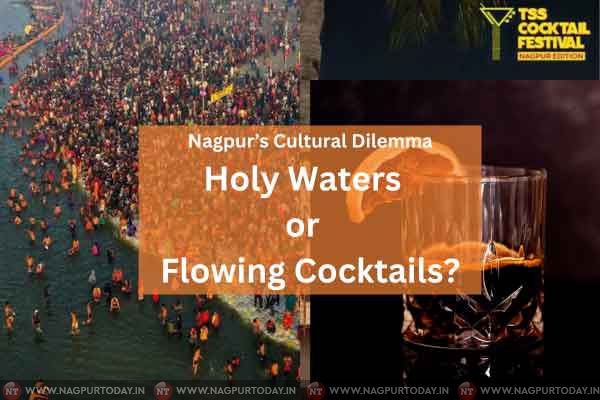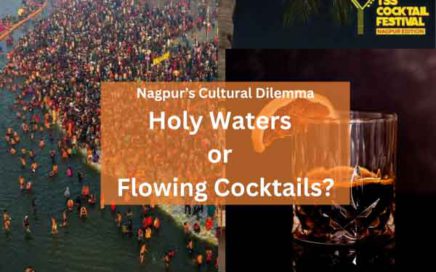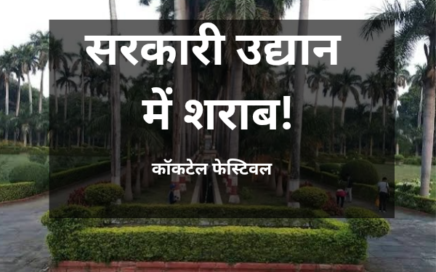
Nagpur, a city known for its deep-rooted culture and spiritual heritage, is facing a paradox this February 15. On one hand, we have the grand ‘Maha Kumbh Prayag Yog’—a sacred event where thousands will gather to receive and revere the holy water from Triveni Sangam. Devotees, including many young people, will immerse themselves in a spiritually uplifting experience, embracing purity, devotion, and tradition.
Yet, just a few kilometers away, at the Telangkhedi Garden, another gathering will take place—a festival, but of an entirely different nature. The TSS Cocktail Festival, promoting liquor, indulgence, and entertainment, will be drawing a very different crowd. The irony is stark: while one event calls for the cleansing of the soul, another openly encourages indulgence in alcohol.
Where Is Our Culture Headed?
We, as a society, must ask ourselves—where are we leading our youth? On the same day, in the same city, we are urging them to take a holy dip in sacred water while also luring them to an event that glorifies drinking. Is this the kind of message we want to send? Have we, as a society, lost our ability to differentiate between celebration and cultural degradation?
For centuries, Indian culture has emphasized moderation, self-discipline, and spiritual elevation. Festivals have been about togetherness, devotion, and celebration of life in meaningful ways. The Kumbh Mela itself is a testament to this—where millions gather not for entertainment, but for spiritual enlightenment. And yet, in the very same city, permission has been granted to an event that seems to stand in complete opposition to these values.
Should Such Events Be Banned?
The issue is not just about one event; it is about the precedence it sets. If a cocktail festival is allowed to run parallel to a religious gathering, what stops future organizers from hosting such events during other sacred occasions? Will we soon see bars popping up next to temple festivals? Will every major spiritual event have a liquor-fueled party running alongside it?
Authorities need to rethink their priorities. It is deeply concerning that permission for such an event was granted in the first place ( if granted ). The same government that promotes the importance of Indian culture, spirituality, and youth development should not be the one allowing events that encourage alcohol consumption among the very same youth.
A Call for Reflection
While we do not advocate for a ban on social gatherings or entertainment events, there must be a sense of responsibility in planning and approving them. A cocktail festival could have been scheduled on any other weekend, but holding it on the same day as a religious event raises serious ethical and cultural questions.
Our city officials, cultural leaders, and citizens must reflect on the kind of legacy we are leaving behind. Are we safeguarding our cultural identity, or are we allowing it to be diluted in the name of “modernity” and “entertainment”?
It is time to choose: do we stand for our traditions, or do we let commercialization dictate our values?














